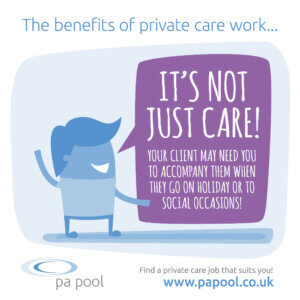
The role a PA (Personal Care Assistant), is to help your employer live a fulfilling and independent life.
Here are some tips to help you provide the best experience for you and your employer:
- Build a good relationship: One of the most important things you can do is to build a strong relationship with your employer. This includes being respectful, trustworthy, and reliable. Show genuine interest in their life and be willing to listen and communicate openly.
- Be attentive: Pay close attention to your employer's needs and preferences. This includes understanding their routines, preferences, and limitations. Anticipate their needs and be proactive in finding ways to help them live the way they choose.
- Maintain boundaries: While building a strong relationship is important, it's also important to maintain boundaries. Remember that you are a professional and not a friend. Avoid becoming too involved in their personal life, and always respect their privacy.
- Stay organised: Keep track of your employer's schedule, appointments, and medication needs. Make sure to stay organized and maintain detailed records of all activities.
- Be adaptable: As a personal care assistant, you will likely encounter unexpected situations. Be prepared to adapt to changing circumstances and handle difficult situations with patience and professionalism.
- Continuously learn: Stay informed about new technologies and techniques that can improve your ability to provide care. Attend training sessions and seek out opportunities to expand your knowledge and skills.
- Be empathetic: Show empathy and compassion towards your employer. Remember that they are relying on you for help, and your kindness and understanding can make a significant difference in their life.
As a PA (Personal Care Assistant) you play a vital role in supporting people with their daily needs and activities so it's important for you to take care of yourself too. By maintaining your own well-being, you can provide the best possible care to your clients.
Here are some tips on how PAs can look after themselves:
- Take breaks: PAs may work long hours and may not always have regular breaks. It's important to take breaks throughout the day to recharge and rest.
- Stay hydrated and nourished: Make sure you're staying hydrated and eating nutritious meals. Bring a water bottle and snacks to work to ensure you have something to eat and drink throughout the day.
- Practice good hygiene: Follow good hygiene practices, including washing your hands regularly, wearing personal protective equipment (PPE) when necessary, and keeping your work area clean.
- Get enough rest: Prioritise getting enough sleep each night. This will help you feel rested and energized for work the next day. If this is not possible maybe use your break time for a quick nap.
- Stay physically active: Try to stay physically active, whether through exercise, stretching, or other activities. This will help prevent muscle strain and other physical injuries.
- Seek support: Seek support from support services, colleagues, or friends and family if you're feeling overwhelmed or stressed. Talking to someone can help relieve stress and provide perspective.
- Set boundaries: It’s important to set boundaries between work and personal life. This could mean disconnecting from work when you’re off-duty or taking time off when needed to prevent burnout.
 The role a PA (Personal Care Assistant), is to help your employer live a fulfilling and independent life.Here are some tips to help you provide the best experience for you and your employer:
The role a PA (Personal Care Assistant), is to help your employer live a fulfilling and independent life.Here are some tips to help you provide the best experience for you and your employer: